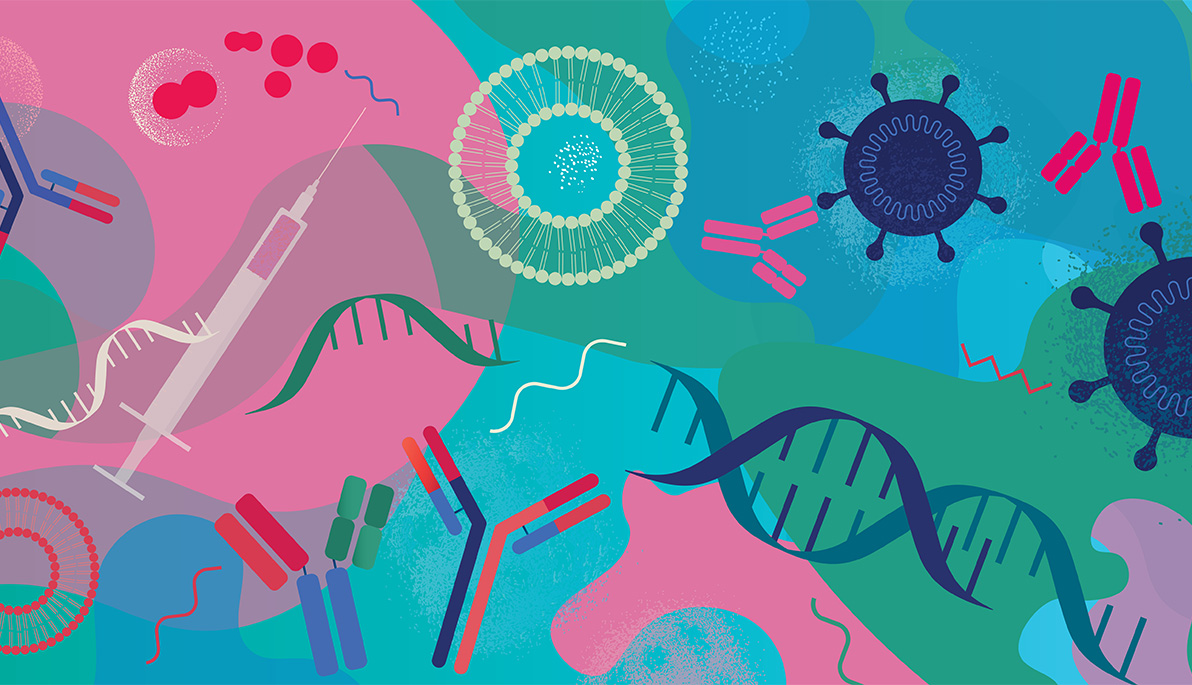
Debunking Myths in Support of COVID-19 Vaccines
October 15, 2021
“What’s the Big Fuss About COVID-19 Vaccines?” was the theme of the October 12 edition of the College of Arts and Sciences Dean’s Digital Café. Professor Michael Hadjiargyrou, Ph.D., chair of the Department of Biological and Chemical Sciences and expert in molecular and cellular biology, tackled the timely topic with an in-depth discussion of the structure of SARS-CoV-2 and the vaccines that have been developed to combat the virus. He spoke about the efficacy of the vaccine, its safety, manufacturing, and its necessary role in helping to develop herd immunity to successfully combat the global pandemic.
Through colorful visuals, attendees saw firsthand how SARS-CoV-2 (Severe Acute Respiratory Syndrome CoronaVirus 2) and its spike proteins (a protein that forms a large structure known as a spike) attack the respiratory system and how they interact with a healthy immune system that has benefited from vaccination. Hadjiargyrou underscored that, unlike some other vaccines, the modern mRNA vaccines do not contain the virus but instead feature a short piece of mRNA (a “blueprint”) that initiates the production of the spike protein. The most important effect of the vaccine, he noted, is the development of immune memory in the body that helps kill the virus or minimize its effects.
“The active ingredient is just mRNA along with a bunch of organic stuff like lipids, sugars, and salts,” he said, debunking claims that it is unsafe for everyone or specific populations, like women who are pregnant or plan to be. “The vaccines do not contain eggs, gelatin, latex, preservatives, metals or electronics, or any manufactured products. You are not being injected with the virus, it is all organic, so there is no reason it should affect fertility. And babies will be born with immunity.”
Hadjiargyrou discussed the necessary stages and clinical trials that vaccines must go through as their manufacturers seek approval. He addressed concerns related to how quickly COVID-19 vaccines became available vs. the polio vaccine, which took 60 years, or the Ebola vaccine, which took about 15 years. “First of all, we have been dealing with coronaviruses for 20 years, and we also had lots of information on mRNA vaccines. That technology already existed,” he said, noting that the other reason for the quick rollout was that billions of dollars from the U.S. government was available to support the effort and to conduct the much-needed clinical trials. The result has been vaccines manufactured for distribution in the United States by Pfizer, Moderna, and Janssen (Johnson & Johnson) that are extremely effective in minimizing the effects of COVID-19.
In addressing herd immunity, Hadjiargyrou said an estimated 90 percent or more of a country’s total population would need to be fully vaccinated to reach a threshold of protection against the virus. Current projections estimate that herd immunity could be reached in the United States by June 2022, when 90 percent of adults and children would have been vaccinated. “We could hit that target before as more mandates are enacted,” he noted.
Hadjiargyrou quickly summarized the reasons for vaccination:
- It prevents you from getting COVID-19, becoming seriously ill, or dying due to COVID-19. “Right now, we are seeing that it is a pandemic of the unvaccinated.”
- The vaccine prevents you from spreading the virus. Because your immune system is killing the virus, you cannot spread it.
- You are contributing to eventual herd immunity of the entire population.
- If you are vaccinated, you are preventing the virus from spreading and replicating, which allows it to mutate and become more resistant to vaccines.
He noted that the Centers for Disease Control and Prevention (CDC) recommends getting the same vaccine for both doses, and that there is no data yet about “mixing and matching” when it comes to booster shots. For those who have had COVID-19, it’s still important to get the vaccine as it serves as a booster against the virus.
More Features

An Alumnus’ Commitment to the Environment
As an energy management graduate from New York Tech’s Vancouver campus, Jasdeep Gulati (M.S. ’22) is highly invested in educating people about environmental and climate sustainability.

Vancouver Faculty Win University-Sponsored Research Awards in New Program
The new Global Impact Research Grant (GIRG) program has been developed to keep Vancouver-based faculty connected to faculty and research projects being conducted on the university’s New York campuses.

Studying Climate Change One Degree at a Time
Junhua Qu (M.S. ’24) began her collegiate journey in Beijing. But, her interest in climate change took her to New York Tech’s Vancouver campus to study energy management.
